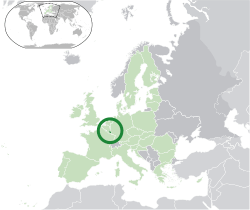LGBT rights in Luxembourg
| LGBT rights in Luxembourg | |
|---|---|
 Location of Luxembourg (dark green) – in Europe (light green & dark grey) | |
| Same-sex sexual intercourse legal status |
Legal since 1794, equal age of consent |
| Gender identity/expression | Transgender people allowed to change legal gender without surgery |
| Military service | Gays, lesbians and bisexuals allowed to serve openly |
| Discrimination protections | Sexual orientation and "change of sex" protections (see below) |
| Family rights | |
| Recognition of relationships |
Partnership since 2004 Marriage since 2015 |
| Adoption | Stepchild and joint adoption since 2015 |
Lesbian, gay, bisexual and transgender (LGBT) people in Luxembourg enjoy the same rights as non-LGBT people. The country is tolerant of homosexuality, and it is largely respected and accepted. Partnerships, which grant many of the benefits of marriage, are recognised. In June 2014, the Luxembourgish Parliament passed a law enabling same-sex marriage and adoption rights, which took effect on 1 January 2015. A large majority of Luxembourgers support same-sex marriage. Additionally, discrimination on the basis of sexual orientation and "change of sex" is outlawed.
Law regarding same-sex sexual activity
Same-sex sexual activity was decriminalised in 1794 (when the country was a French possession). Article 372 of the Penal Code sets the age of consent to 16, regardless of sexual orientation and/or gender. This was increased to 18 for same-sex sexual activity in 1971 by the addition of article 372bis to the Penal Code, which was repealed in 1992.[1]
Recognition of same-sex relationships
Partnerships have been available in Luxembourg since 2004. Partnerships, called partenariat in French and Partnerschaft in Luxembourgish and German, are based on the French PACS model. The Partnership Act which permits these unions was enacted on 1 November 2004.[2]
In 2009, the Government of Luxembourg announced its intention to legalise same-sex marriage. However, after much delay, a final vote was not held until June 2014, when it passed by 56 votes to 4 and took effect on 1 January 2015.
Adoption and family planning
After a parliamentary vote in June 2014, a law granting full adoption rights to same-sex couples came into effect on 1 January 2015.
Additionally, lesbian couples can access IVF and medically assisted insemination treatment.
Discrimination protections

Luxembourgish law prohibits discrimination (both direct and indirect) based on sexual orientation and "change of sex" (within the definition of sex) in employment, education, social security, healthcare, and the provision of goods and services.[3][4] In addition, hate crime legislation also refers to these characteristics and they are recognised as aggravating factors.[5]
Luxembourgish nationals are allowed to serve in the Armed Forces regardless of sexual orientation.
Gender identity and expression
In the past, Luxembourg legally required all transgender people to undergo surgery, sterilization and divorce before a change of gender on documents. However, on 12 May 2017, the Government approved a bill to regulate the procedure of legal sex changes.[6] An adult person would need to submit an application to the Ministry of Justice to change their legal sex. No surgery, sterilization, divorce or other medical treatment would be required. Minors would be able to apply for a sex change through their legal guardians.[7][8][9] On 31 May, the bill was submitted to the Parliament,[10] and was approved in a 57-3 vote, on 25 July 2018.[11][12][13] On 27 July 2018, the Council of State gave its consent to skip the second vote.[14] It was promulgated by the Grand Duke on 10 August and published in the official journal on 12 September. The law took effect on 16 September 2018.[15]
LGBT rights movement in Luxembourg

Luxembourg's main LGBT rights group is Pink Luxembourg (Luxembourgish: Rosa Lëtzebuerg). It was founded on 26 June 1996 and had 220 members by 2004.[16] Its aims are to promote the civil rights of LGBT people, to fight against discrimination, to work in terms of social, cultural and legal matters for full equality, and to organise social and cultural activities.[17]
Public opinion
A Eurobarometer survey published in December 2006 showed that 58% of Luxembourgers surveyed supported same-sex marriage and 39% supported adoption by same-sex couples. The EU-wide average in this survey was 44% and 33%, respectively.[18] By 2015, support had increased to 75%.[19]
Summary table
| Same-sex sexual activity legal | |
| Equal age of consent | |
| Anti-discrimination laws in employment only | |
| Anti-discrimination laws in the provision of goods and services | |
| Anti-discrimination laws in all other areas (incl. indirect discrimination, hate speech) | |
| Anti-discrimination laws concerning gender identity | |
| Same-sex marriage | |
| Recognition of same-sex couples | |
| Stepchild adoption by same-sex couples | |
| Joint adoption by same-sex couples | |
| Gays, lesbians and bisexuals allowed to serve openly in the military | |
| Right to change legal gender | |
| Access to IVF for lesbians | |
| Conversion therapy banned on minors | |
| Commercial surrogacy for gay male couples | |
| MSMs allowed to donate blood |
See also
References
- ↑ Rapport du Groupe européen d'Experts dans le domaine de la Lutte contre la Discrimination fondée sur l’Orientation sexuelle
- ↑ Loi du 9 juillet 2004 relative aux effets légaux de certains partenariats
- ↑ Loi du 28 novembre 2006
- ↑ Loi du 3 juin 2016
- ↑ Code Pénal
- ↑ Résumé des travaux du 12 mai 2017
- ↑ Projet de loi relative à la modification de la mention du sexe et du ou des prénoms à l’état civil et portant modification du Code civil
- ↑ La procédure va être simplifiée à l'état civil
- ↑ Personnes transgenres et intersexes : l’état civil laissera le choix de l’identité
- ↑ 7146 - Projet de loi relative à la modification de la mention du sexe et du ou des prénoms à l'état civil et portant modification du Code civil
- ↑ Chambre : Changement d’état civil simplifié pour les personnes transgenres
- ↑ Luxembourg makes status change for transgender people easier
- ↑ Progressive legislation to make changing gender easier
- ↑ Projet de toi relative à la modification de la mention du sexe et du ou des prénoms à l'état civil et portant modification du Code civil - Dispense du second vote constitutionnel par le Conseil d'État (27.7.2018)
- ↑ Loi du 10 août 2018 relative à la modification de la mention du sexe et du ou des prénoms à l’état civil et portant modification du Code civil
- ↑ Rosa Lëtzebuerg a.s.b.l.
- ↑ (in French) Présentation de l'association Archived 20 February 2007 at the Wayback Machine.
- ↑ Eight EU Countries Back Same-Sex Marriage
- ↑ DISCRIMINATION IN THE EU IN 2015
- ↑ Luxembourg makes status change for transgender people easier
- ↑ "Archived copy". Archived from the original on 6 April 2015. Retrieved 2014-12-23.